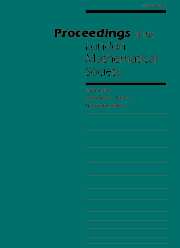Article contents
WEYL–TITCHMARSH M-FUNCTION ASYMPTOTICS FOR MATRIX-VALUED SCHRÖDINGER OPERATORS
Published online by Cambridge University Press: 20 August 2001
Abstract
We explicitly determine the high-energy asymptotics for Weyl--Titchmarsh matrices corresponding to matrix-valued Schr\"odinger operators associated with general self-adjoint $m\times m$ matrix potentials $Q\in {L^1_{\text{loc}} ((x_0,\infty))}^{m\times m}$, where $m\in{\mathbb N}$. More precisely, assume that for some $N\in {\mathbb N}$ and $x_0\in{\mathbb R}$, $Q^{(N-1)}\in L^1([x_0,c))^{m\times m}$ for all $c>x_0$, and that $x\geq x_0$ is a right Lebesgue point of $Q^{(N-1)}$. In addition, denote by $I_m$ the $m\times m$ identity matrix and by $C_\varepsilon$ the open sector in the complex plane with vertex at zero, symmetry axis along the positive imaginary axis, and opening angle $\varepsilon$, with $0<\varepsilon< \frac12\pi$. Then we prove the following asymptotic expansion for any point $M_+(z,x)$ of the unique limit point or a point of the limit disk associated with the differential expression $-I_m\frac{d^2}{dx^2}+Q(x)$ in ${L^2((x_0,\infty))}^m$ and a Dirichlet boundary condition at $x=x_0$: \begin{equation} M_+(z,x)\underset{|z|\to\infty,\, z\in C_\varepsilon}{=} i I_m z^{1/2}+ \sum_{k=1}^N m_{+,k}(x)z^{-k/2}+ o(|z|^{-N/2}), \quad \text{where }N\in{\mathbb N}. \nonumber \end{equation} The expansion is uniform with respect to $\arg\,(z)$ for $|z|\to \infty$ in $C_\varepsilon$ and uniform in $x$ as long as $x$ varies in compact subsets of ${\mathbb R}$ intersected with the right Lebesgue set of $Q^{(N-1)}$. Moreover, the $m\times m$ expansion coefficients $m_{+,k}(x)$ can be computed recursively. Analogous results hold for matrix-valued Schr\"odinger operators on the real line. 2000 Mathematics Subject Classification: 34E05, 34B20, 34L40, 34A55.
- Type
- Research Article
- Information
- Copyright
- 2001 London Mathematical Society
- 28
- Cited by




